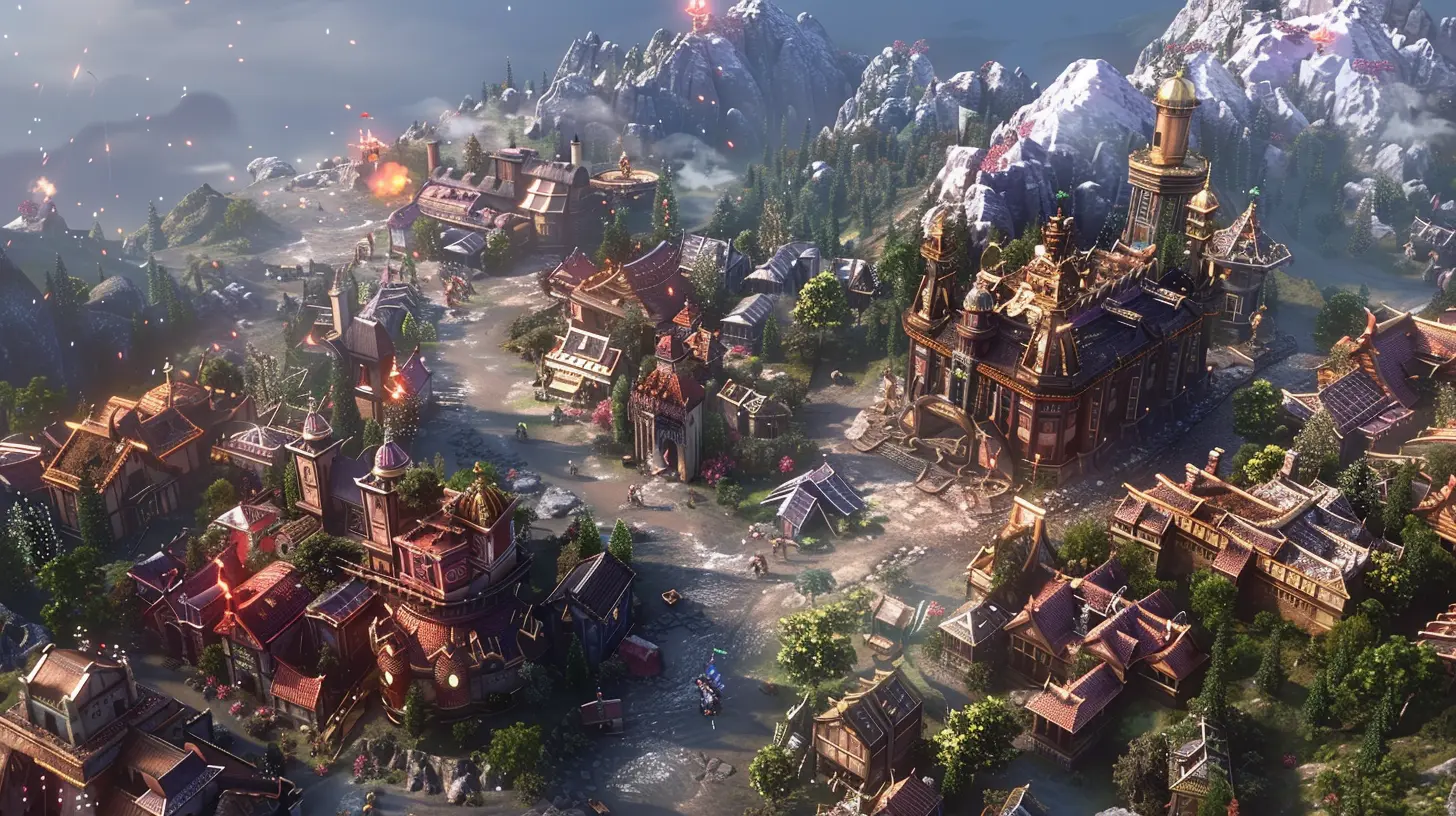How to Optimize Your Economy for Long-Term Success in Strategy Games
2 March 2025
If you've ever played any strategy game, you know that building a strong economy is the secret sauce to long-term success. Whether it’s balancing resources in “Civilization,” managing gold in “Age of Empires,” or growing your production capacity in “Stellaris,” a solid economic foundation keeps your empire thriving while others falter. But let’s be honest—economic management can feel like juggling flaming swords while riding a unicycle.
So, how do you stop the chaos and create an economy that’s sustainable, efficient, and ready to take on whatever the game throws at you? Let’s break it down step by step. Trust me, by the time you’re done reading this, you’ll be optimizing your economy like a pro and leaving your competition in the dust.
Why Your Economy is the Backbone of Strategy Games
Alright, before we get into the nitty-gritty, let’s talk about why your economy even matters. Think of your economy as the engine of your car. Without a well-oiled engine, your ride is going nowhere. Sure, you might pull ahead with aggressive tactics early on, but without a reliable income of resources, your momentum will eventually stall.In strategy games, your economy influences everything—how big your army is, how advanced your technology gets, and how quickly you can bounce back after a devastating attack. Whether it’s gathering wood, mining gold, or trading goods, a poor economy will leave you vulnerable. And trust me, your enemies are just waiting for that moment to pounce.
Step 1: Start Small but Think Big
One of the biggest mistakes players make is going all-in too early. Have you ever dumped all your resources into building a massive army right out the gate? Guess what happens next—your economy crashes faster than a toddler on a sugar high.Instead, focus on creating a stable foundation. In most strategy games, this means starting with the basics. Gatherers, workers, or whatever the game calls them—they’re your bread and butter. Prioritize expanding your workforce before you think about grander plans.
But here’s the trick: always plan ahead. Think of your early economy like planting a garden. You won’t see results overnight, but with a little patience and care, your investments will bloom into something substantial.
Quick Tip: Pay attention to your game’s tutorial or tooltips. Many games give subtle hints about the best early-game strategies. Don’t skip these—they’re basically cheat sheets. 
Step 2: Diversify Your Resources
Ever heard the phrase “don’t put all your eggs in one basket”? Well, it applies to strategy games, too. Focusing too heavily on one resource is like building a house of cards—one gust of wind (or attack) and it all comes crashing down.Most games have multiple resources: food, wood, gold, energy, you name it. Try to balance your economy across these. Sure, there will be times when you need to prioritize one resource over another (like when you’re prepping for war), but ignoring resource diversity is a recipe for disaster.
Take “Age of Empires” as an example. If you put all your villagers on wood, you’ll run out of food and gold to train new units. But if you spread them too thin, you’ll progress at a snail’s pace. The key is to shift your focus based on your goals.
Pro Tip: Use resource bonuses or trade when possible. Some games offer perks like marketplaces or trade routes that let you convert excess resources into what you’re lacking. Mastering this will give you a competitive edge.
Step 3: Manage Upkeep Costs
Let’s talk about one of the sneakiest ways your economy can implode—upkeep costs. You’ve probably been there before: you’ve built an awe-inspiring army or a shiny new fleet, only to realize you can’t afford to maintain it. Yep, upkeep costs are the silent killer of many empires.Every unit, building, or infrastructure upgrade usually comes with some sort of maintenance cost. If you don’t keep these in check, you’ll find yourself in a vicious cycle of running out of resources just to stay afloat.
A simple solution? Don’t overcommit. Before you build that extra barracks or train 20 more soldiers, ask yourself: Can I actually afford this in the long run? Sometimes, quality trumps quantity. A small, well-equipped force often outperforms a massive, poorly-funded one.
And hey, don’t forget about dismantling or selling things you no longer need. If that old granary or watchtower isn’t adding value, tear it down and reallocate the resources elsewhere.
Step 4: Expand Your Territory Strategically
Expansion is exciting, right? New land, new resources, new opportunities. But here’s the thing—expanding blindly is like biting off more than you can chew. Every new territory you acquire comes with additional responsibilities and costs. If you spread yourself too thin, your shiny new empire can crumble faster than you’d think.Instead, focus on strategic expansion. Prioritize areas that provide high-value resources or strategic positioning. For example, in “Civilization,” it’s often better to settle near rivers or coastlines to gain access to water resources and trade routes.
Timing is just as important as location. Don’t expand too early—wait until your core economy is stable enough to support additional settlements or outposts. And don’t ignore defense. What’s the point of claiming new territory if you can’t protect it?
Step 5: Invest in Technology and Upgrades
Economic optimization isn’t just about resource gathering; it’s also about efficiency. That’s where technology and upgrades come in. Most strategy games include research options or tech trees that improve your resource production, reduce upkeep costs, or unlock new economic strategies.The trick is knowing what to prioritize. Do you go for faster resource gathering? Stronger trade routes? Cheaper military units? There’s no one-size-fits-all answer—it depends on your playstyle and goals.
But here’s a golden rule: never neglect your economy upgrades in favor of military or exploration tech. A stronger economy will naturally support your other priorities over time. Invest in it early and often.
Step 6: Anticipate and Adapt to Challenges
No matter how carefully you plan, your economy will face challenges. Maybe a rival player decides to raid your supply lines. Maybe a natural disaster strikes your colony. Or maybe you overestimated your resource stockpile before committing to a massive project.The key to overcoming these obstacles is adaptability. Always keep a buffer of resources for emergencies. Think of it as your “rainy day fund.” If your stockpile is bone-dry, even a minor setback can snowball into a full-blown crisis.
Another strategy? Scout your opponents. If you know what they’re up to, you can anticipate threats and adjust your economy accordingly. For example, if you notice your rival building up their navy, focus on strengthening your coastal defenses and resources tied to naval combat.
Step 7: Always Think Long-Term
Sure, short-term victories are satisfying. But strategy games are marathons, not sprints. If all your decisions are based on immediate gratification, you’re setting yourself up for failure.For instance, don’t exhaust a resource node just because you can. Pace yourself. Consider sustainable practices, like rotating your gatherers or setting up trade routes that provide a steady income. Think about the bigger picture—how will your economy look 50, 100, or 200 turns from now?
Common Mistakes to Avoid
Let’s wrap up with some quick reminders of the biggest economic pitfalls:1. Neglecting Early Development: Skipping your early economic foundation in favor of rushing units or tech is a recipe for disaster.
2. Ignoring Upkeep Costs: Always factor in upkeep before committing to new units or buildings.
3. Overexpansion: Don’t expand faster than your economy can support.
4. Forgetting to Scout: Knowing what your rivals are up to can save you from nasty surprises.
5. Not Adapting: Sticking to a rigid strategy when things go sideways will sink your economy in no time.
Final Thoughts
Building a long-term economy in strategy games doesn’t have to be overwhelming. By starting small, diversifying your resources, and planning for the future, you’ll create a sustainable economy that can weather any storm—be it an in-game raid or a rival’s sudden attack. And hey, it’s okay if you mess up here and there. The beauty of strategy games is learning from your mistakes and coming back stronger the next time.So, the next time you’re staring at a barren resource map or deciding whether to build that extra barracks, just remember: a strong economy isn’t built in a day. Take it step by step, and soon enough, you’ll be the one dominating the leaderboard.
all images in this post were generated using AI tools
Category:
Strategy GamesAuthor:

Audrey McGhee
Discussion
rate this article
8 comments
Zarek Perez
Great insights! Effective economy boosts strategic gameplay significantly.
March 25, 2025 at 4:48 AM

Audrey McGhee
Thank you! I'm glad you found the insights valuable. Optimizing your economy is indeed key to enhancing strategic gameplay!
Harley McAllister
Optimizing your economy in strategy games is like trying to find the last slice of pizza at a party—everyone wants it, but only a few know the secret stash. Happy hunting for that cheesy victory!" 🍕🎮
March 20, 2025 at 4:27 AM

Audrey McGhee
Great analogy! Just like the secret stash, mastering economic optimization can lead to sweet victories in strategy games. Keep hunting for those strategies! 🍕🎮
Xander Kirk
Great insights! Optimizing your economy in strategy games is crucial for sustained success. It can be challenging to balance resource management and expansion, but your tips provide a clear roadmap. Remember, every player's journey is unique, so experimenting and adapting strategies can lead to rewarding experiences. Keep up the fantastic work!
March 18, 2025 at 4:41 PM

Audrey McGhee
Thank you for your thoughtful comment! I completely agree—balancing resource management and expansion is key, and adapting strategies truly enhances the gaming experience. Appreciate your support!
Easton Lee
Ah, the economy in strategy games: where balancing resources feels like juggling flaming torches while riding a unicycle. Just remember, it's all fun until you forget to build farms!
March 15, 2025 at 5:43 PM

Audrey McGhee
Absolutely! Balancing resources can be tricky, but prioritizing essential structures like farms can keep your economy stable and thriving. Keep juggling those torches!
Rylan Hughes
Mastering economic strategies is essential for sustained success in strategy games. Focus on resource management, expansion, and adaptability to thrive!
March 13, 2025 at 3:46 PM

Audrey McGhee
Thank you for your insightful comment! I completely agree—effective resource management, strategic expansion, and adaptability are crucial for long-term success in strategy games.
Selena Lewis
Great tips! Balancing resources always feels like walking a tightrope—excited to implement these strategies!
March 10, 2025 at 5:59 AM

Audrey McGhee
Thank you! I'm glad you found the tips helpful. Best of luck with your strategies!
Emma Carter
Great tips! Focusing on resource management and strategic planning is key for sustainable success in strategy games.
March 5, 2025 at 6:05 AM

Audrey McGhee
Thank you! I'm glad you found the tips helpful. Effective resource management truly is essential for long-term success in strategy games.
Dominic Clarke
Great insights on economic strategies! Focusing on resource management and long-term planning is crucial for thriving in strategy games. Can't wait to implement these tips in my next campaign!
March 4, 2025 at 6:03 AM

Audrey McGhee
Thank you! I'm glad you found the insights helpful. Best of luck in your next campaign!
MORE POSTS

Fantasy Worlds vs. Sci-fi Universes: Approaching World Building in Different Genres

Must-Try PlayStation Exclusives That You Might Have Missed

Leveling Up Faster: Tips to Maximize Game Progress

Spectator Experience: How Gaming Tournaments Engage Non-Players

PC Gaming Platforms: How Steam Dominated the Market

How to Efficiently Research Tech Trees in Strategy Games